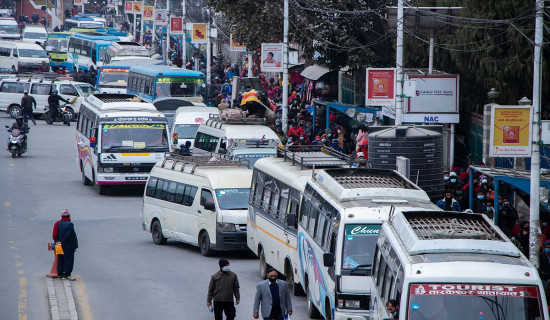- Thursday, 22 January 2026
Pushpalal: Visionary Leader
This year Nepali communist parties are marking the birth centenary of Pushpalal, the founder of Nepal Communist Party (NCP), with a variety of functions across the country. Pushpalal, who pioneered Nepali communist movement, was born at Bhangeri of Ramechhap district on Ashar 15, 1981 B.S. and breathed his last on Shrawan 7, 2035 B.S. while undergoing treatment at Govinda Ballav Pant Hospital, New Delhi.
With a view to preparing ground to establish a Communist Party of Nepal (CPN), he constituted a preparatory committee along with his four fellow comrades - Niranjan Govinda Vaidhya, Nar Bahadur Karmacharya, Motidevi Shrestha and Narayan Bilas Joshi. As a coordinator of the committee, Pushpalal worked hard to prepare a comprehensive manifesto of the would-be party, which offers the Marxist analysis of Nepali society and makes an epochal call for establishing democracy and equality in the country. Accordingly, the central organising committee proclaimed the establishment of Communist Party of Nepal on September 15, 1949.
However, the trailblazer of Nepali communist movement was neglected in the party from the very beginning. In its first convention held in Patan, Lalitpur, in 1954, Pushpalal was replaced by Man Mohan Adhikary as its general secretary. Despite being sidelined in the party, he stuck to its discipline and decisions. He put his energy in the peasant movements in different parts of the country, especially in Tarai belt. Kisan Sangh, (Farmer's Union), the party's sister wing, launched revolt against landlords on June 8, 1952, demanding the distribution of land to the landless farmers. The NCP stood against the Delhi Agreement. The party was banned for its revolutionary stance and activities.

Puspalal often fell into minority in the party but he never abandoned his republican agenda and always stood against the foreign interference and domination of all forms. He always stressed for joint struggle against the feudalism and autocratic Pachayat system. For this, he appealed to left and democratic forces for broader alliance and unity. But his call was lost in the wilderness. But history was a testament to the fact that his strategy of joint struggle was far-sighted and pragmatic. As democratic and left forces joined hands, the country ushered in multiparty democracy in 1990.
Pushpalal was the younger brother of great martyr – Gangalal Shrestha. His elder brother asked him never let the light of democracy die down. He followed the path of his martyr brother and never surrendered to the feudal Panchayat system. He used to say that the party must make ceaseless efforts to prevent enemies from reaching out to the people. He called for unity for the common cause – people's democratic rights and civil liberties, which will naturally pave the way for the establishment of New Democracy through the mobilisation of masses and consolidation of the party.
Pushpalal wrote books on Nepali politics, movements, culture and history. He never compromised with any of undemocratic forces, and struggled and devoted his entire life for the emancipation of Nepali people. He was a true visionary and dedicated leader of Nepali people.
(The author is NCP chairman)
















